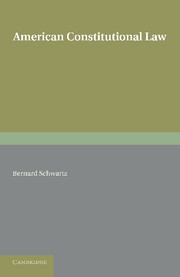Book contents
- Frontmatter
- Dedication
- Contents
- Foreword
- Preface
- PART I THE STRUCTURE
- Chapter I The Bases of the American System
- Chapter II The Federal System
- Chapter III The Congress
- Chapter IV The President
- Chapter V The Courts
- PART II MODERN DEVELOPMENTS
- Appendix: Constitution of the United States of America
- Index of Cases
- General Index
Chapter V - The Courts
from PART I - THE STRUCTURE
Published online by Cambridge University Press: 05 June 2016
- Frontmatter
- Dedication
- Contents
- Foreword
- Preface
- PART I THE STRUCTURE
- Chapter I The Bases of the American System
- Chapter II The Federal System
- Chapter III The Congress
- Chapter IV The President
- Chapter V The Courts
- PART II MODERN DEVELOPMENTS
- Appendix: Constitution of the United States of America
- Index of Cases
- General Index
Summary
The position of the courts in a country is of crucial importance to one seeking to comprehend its constitutional institutions. The proper function of the constitutional lawyer, according to A. V. Dicey, is to show what are the legal rules (i.e. rules recognized and enforced by the courts) which are to be found in the several parts of the constitution. Adequate performance of this function presupposes an understanding of the organization and functioning of the judiciary. This is especially true for one interested in the study of the law of the American Constitution. For it has become almost a commonplace that the courts in the United States—and especially the Supreme Court—are the fulcrum upon which the American constitutional system turns. ‘In no country in the world today has the lawyer a standing remotely comparable with his place in American politics. The respect in which the federal courts and, above all, the Supreme Court are held is hardly surpassed by the influence they exert on the life of the United States. If it is excessive to say that American history could be written in terms of its federal decisions, it is not excessive to say that American history would be incomplete without a careful consideration of them.’
Ever since de Tocqueville, outside observers have emphasized the primordial role of the judge in American society. Nor is this role based exclusively upon the fact that the Constitution of the United States, unlike that in Britain, is a written instrument. Most of the countries of Continental Europe have written constitutions; yet in none of them has the judge attained anything like the status of his American confrère. From a practical point of view, the situation in such Continental countries is basically like that in Britain because of the lack in their system of any effective judicial control of the constitutionality of the laws enacted by the legislature. The restrictions placed upon the legislature under most Continental constitutions are not, in reality, laws since they are not rules which in the last resort will be enforced by the courts. Their true character is that of maxims of political morality, which have more a moral than a legal basis.
- Type
- Chapter
- Information
- American Constitutional Law , pp. 125 - 160Publisher: Cambridge University PressPrint publication year: 2013

